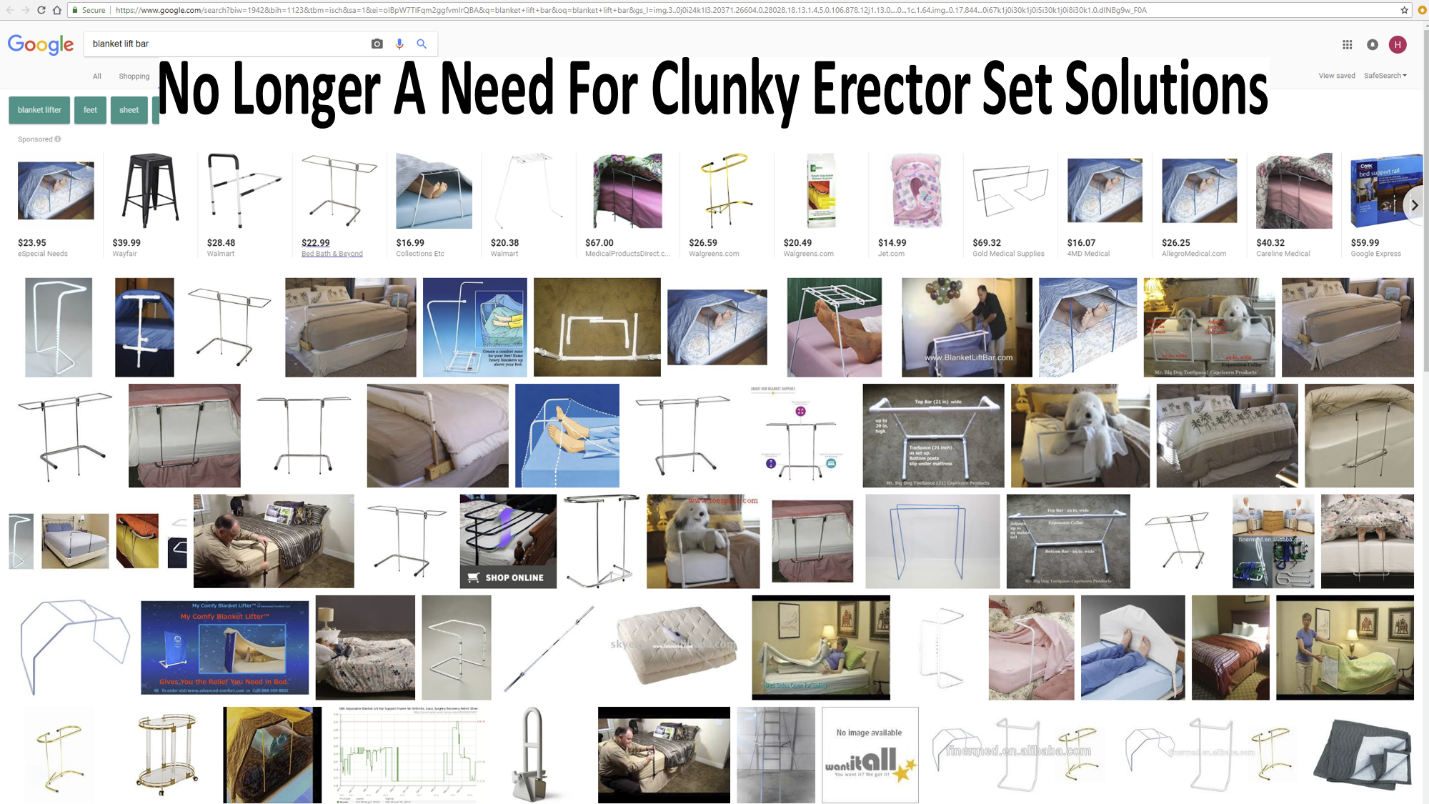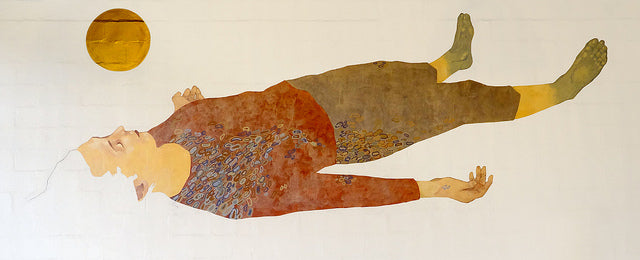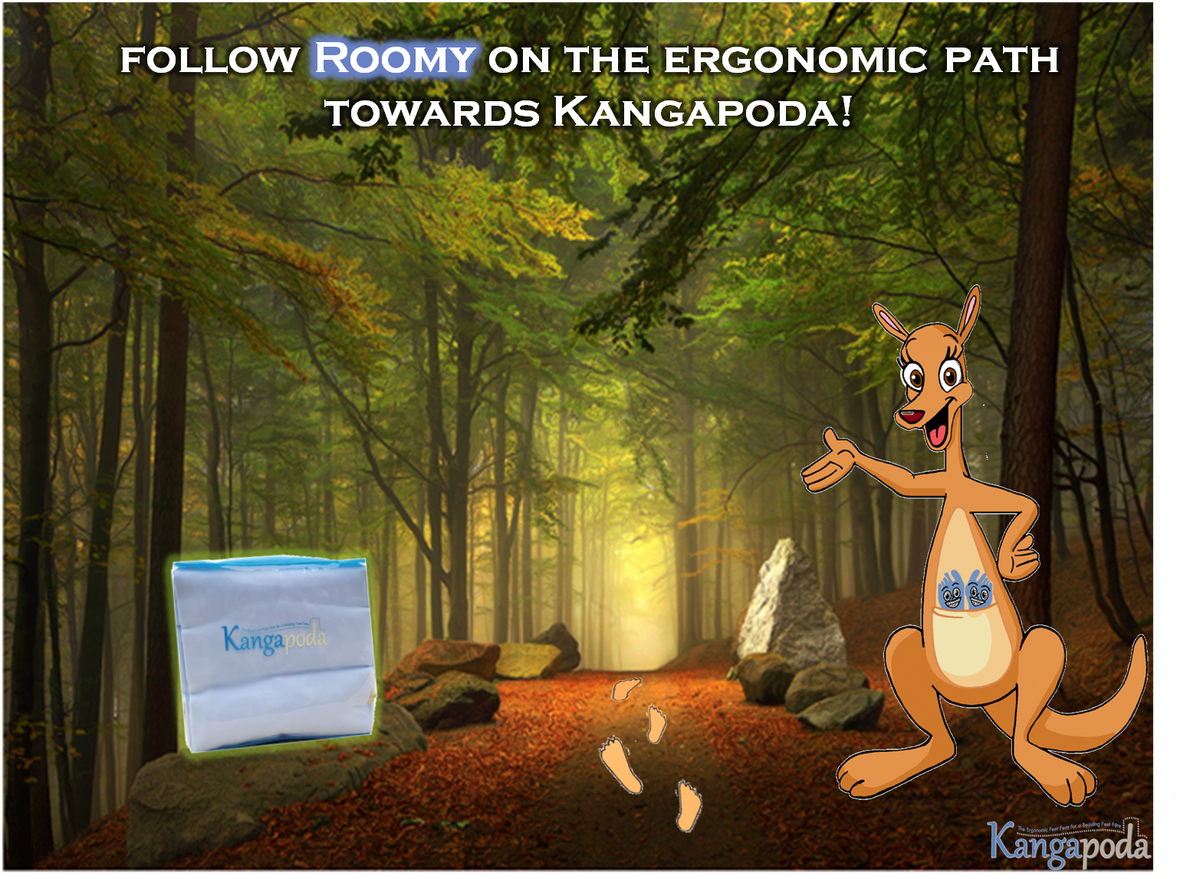Foot Pain from Tight Covers Leads to a Less Good Night’s Sleep

If you Google ‘Blanket Lift Bars’…and then click on ‘Images’…you will pictorially see an array of contraptions that hold up the bed covers. What is apparent is many people dislike having pressure on their feet. Some dislike it so much they are willing to erect unattractive and cumbersome physical structures at the end of the bed to avoid the irritation.
For most of us, an erector set solution is too ugly, unwieldy, and unromantic. But, tight covers do indeed stink when you lie on your back and your toes are forced against them. For those with neuropathy from Type 2 diabetes or gout, arthritic toes, bunions, foot and ankle injuries, or those prone to calf cramps, the pressure from tight covers can be intolerable.
For Kangapoda’s founder, the tight covers helped bring about painful calf cramps when he was watching TV. He could have untucked the covers, but he preferred the coziness of a neat bed. In fact, studies have shown that a neat bed promotes a better night’s sleep.
So this was the conundrum that led to Kangapoda’s founding: either, untuck the covers and have a messy bed that detracts from the quality of the sleep (and necessitates having to make the bed from scratch the next morning); or hope the toe pointing and other foot contortions to cope with the plain flat top sheet’s tightness do not cause a cramp which is the last thing you want to deal with when you are getting ready to sleep.
Think about this you engineers: A product that must be untucked or held up by clunky contraptions to be comfortable is not a properly designed product. See https://vimeo.com/285486096 for a philosopher smile. It is the antithesis of ergonomic—something we all care about in practically every area of our lives. There had to be a more logical, romantic, and aesthetic way to accommodate the feet under the covers. Enter Kangapoda.
The name Kangapoda is the fusion of two concepts. Kanga-, like a kangaroo, was chosen as the prefix because Kangapoda’s patented design includes a pouch-like canopy that expands and drapes the feet when you lie under the covers on your back. The -Poda suffix is a Latin word meaning ‘those having feet’ (and, hearkens to ‘podiatry’ which is the branch of medicine devoted to the feet). So Kangapoda designs patented bed top coverings with an ergonomic pouch / canopy so your feet may lie comfortably.
Foot comfort under the covers is more important than ever before because we use the bed differently than before. Allow me to explain. Most people are not back sleepers. Instead, they prefer to sleep on their stomach or side. For hundreds of years, people would lie down, roll over and go to sleep. That no longer is the case.
Today, most of us spend time each evening reclined on our back with a remote control or smart phone in our hand. As it gets closer to bed time and the ambient air temperature gets chillier, being able to relax and unwind in light clothing under the covers is that much more appealing. It is the final stage before turning off the TV, rolling over, and calling it a night. However, in this ‘viewing’ position, the toes of our right-angle feet press directly against the tight covers.
Certainly, if you never lie on your back, then you don’t need a Kangapoda (see https://vimeo.com/286923355). But, if you do watch TV from bed (and, almost 85% of us have a TV in the bedroom), or you read, or surf the web, or hang out, or rest, nap, or sleep on your back, then Kangapoda is a gamechanger. Comfortable feet under the covers is profoundly important. I use the adverb profoundly because comfortable feet under the covers leads to advantages in many other areas.
Perhaps the most important positive impact is on a better night’s sleep. Sleep, as we know, is important. It allows our bodies to properly recuperate and recharge. The experts advise deep breathing, warm baths, dark quiet rooms, avoiding caffeine, nicotine, and alcohol, and avoiding large meals.
Add to the list a neat bed. That is correct. A neat bed empirically improves the quality of our sleep. Which leads to an interesting baseline question: why do we use covers at all and not just sleep on top of the mattress like a dog? This may sound silly, but it is not. People prefer using covers, and the reasons are physical, neurological, and, perhaps, even psychological.
The body needs extra warmth at night. Your body’s internal temperature begins to cool down before you go to bed. Later in the night and early morning, that cooling off gets less pleasant. During REM sleep, your body can’t regulate its own temperature. And, generally, people tend to be in the REM stage of sleep right around dawn when temperatures are the coldest. So, we naturally learn that even if is warm when we go to bed, we will wake up shivering at 4 a.m. if we are not covered.
Neurologically, blankets have been found to decrease anxiety and stress because gentle pressure can stimulate serotonin production. Serotonin has been found to help modulate sleep regulation. A study published in the Journal of Sleep Medicine & Disorders found that a weighted blanket, in particular, was effective at helping reduce the effects of insomnia.
This helps explain the cyclical correlation between depression and insomnia. When you are depressed, your serotonin levels are low. And when you are unable to sleep, you frequently get out from under the relaxing covers. I believe that psychologically covers may even go to the womb and a feeling of total safety. As validation of the importance of covers, even in tropical regions, most people cover themselves with at least something during the night. The lone exception appears to be some nomadic cultures near the equator.
In conclusion, comfortable feet under the covers will positively and profoundly impact each day. From a more relaxed TV and reading time to a more comfy and recuperative night’s sleep, Kangapoda’s patented ergonomic canopy improves top of the bed comfort and lets your feet feel free.


